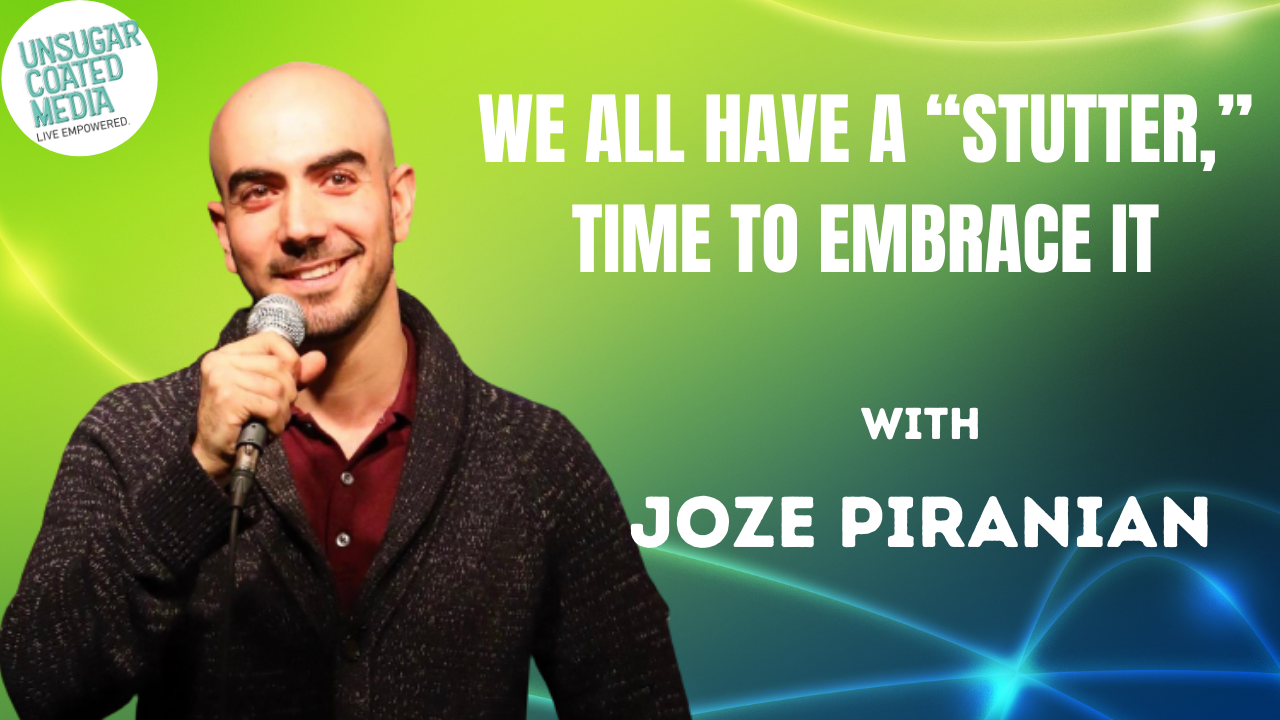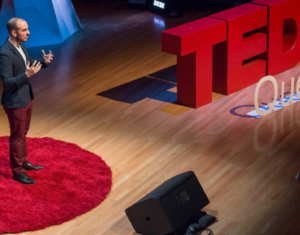
Joze Piranian: We All Have A “Stutter,” Time To Embrace It
By: Lauren Schulsohn, Staff Writer for UNSUGARCOATED Media
Edited by: Kimberly Henry, Senior Staff Writer for UNSUGARCOATED Media
May 31,2021
\As National Stuttering Awareness Week commenced, UNSUGARCOATED Media sat down with speaker, comedian and advocate, Joze Piranian. For his entire life, the Ted Talk speaker has struggled with a stutter that silenced him for 25 years. Through self-discovery and fierce determination, Piranian transformed his own life while simultaneously empowering those around him.
Today, approximately 3 million Americans and more than 70 million people around the world stutter. “Sometimes people will assume that the cause of a stutter is psychological or mental. In reality, it is physiological,” says Piranian. But that does not mean there is no connection between a stuttering condition and mental health. In fact, Piranian’s stuttering led him to develop social anxiety and depression. “For social anxiety, it came from that I was really ashamed about being different. The silence was my only solution for protecting myself from the world,” Piranian adds.
Piranian began to understand that the conversation about speech impediments could not revolve around how to “overcome” the stutter so that people like him could fit in with the world. Instead, Piranian focuses his energy on subduing the self-imposed silence a stutterer creates for themselves out of fear. He realized that he must use his differences to empower and enrich his life.
Before Piranian began motivational speaking, he worked on his ability to be free with his voice, learning breathing techniques designed not to control the stutter but to control his fear of speaking. Additionally, Piranian joined Toastmasters, an online platform that helps people practice and improve their public speaking and communication skills.
Piranian challenges himself to speak to 100 strangers every week in public spaces across the globe in order to grow his confidence with speech. Over time, he has learned to find power in the discomfort of some of these conversations. The occasional unpleasant reaction actually makes the exercise more effective, according to Piranian.
Oftentimes, the pedestrians that Piranian stops on the street will look to their friend for help in the conversation or make uncomfortable faces. Navigating these conversations has helped Piranian immensely in facilitating communication throughout his life. “Typically, the worst-case scenarios hold us back. Once you expose yourself to those scenarios, it allows you to be desensitized to the things that would have held you back,” Piranian says.
Stand-up comedy is another vehicle Piranian has used to improve his speaking skills. “I noticed that whenever I joked about having a stutter, it would empower me to own something I was insecure about in a way that put me in charge of my narrative and the social dynamics,” says Piranian. By controlling the conversation on stage, Piranian controls how the audience interprets his stutter.
While Piranian has made great strides in improving his communication skills, he has also shared his spirit of perseverance with others, whether they had a physical stutter or not. Piranian believes that everyone has an “inner-stutter.” “When I started to share my story after I did my talk, people would come up to me and share how this message changed how they viewed their own obstacles, and that made me realize everyone has a stutter,” Piranian says. Piranian describes a metaphorical stutter that holds people back from doing what they truly desire. This “inner-stutter” stems from fear of judgment, rejection and failure.
Despite the national progress that has been made around stuttering awareness, there is still a long way to go. Although President Joe Biden has publicly addressed his struggles with stuttering, the media has used his trouble with speaking as a way to question his mental capabilities. Piranian urges the media not to make assumptions about a person’s mental fitness based on their stutter, and suggests that if someone is making an unfair assumption, to call that person out.
For 25 years, Piranian stayed silent, afraid of revealing his differences, but he could no longer allow fear of being different to control his life. “It was an accumulation of pain and squandered potential. I no longer wanted to have a subpar life where I was simply controlled by fear of every minute of every day,” says Piranian. Rather than letting fear consume our lives, our greatest insecurities and differences should serve as a teacher and a motivator if we just lean into the discomfort.
To learn more about Joze Piranian visit his website.




